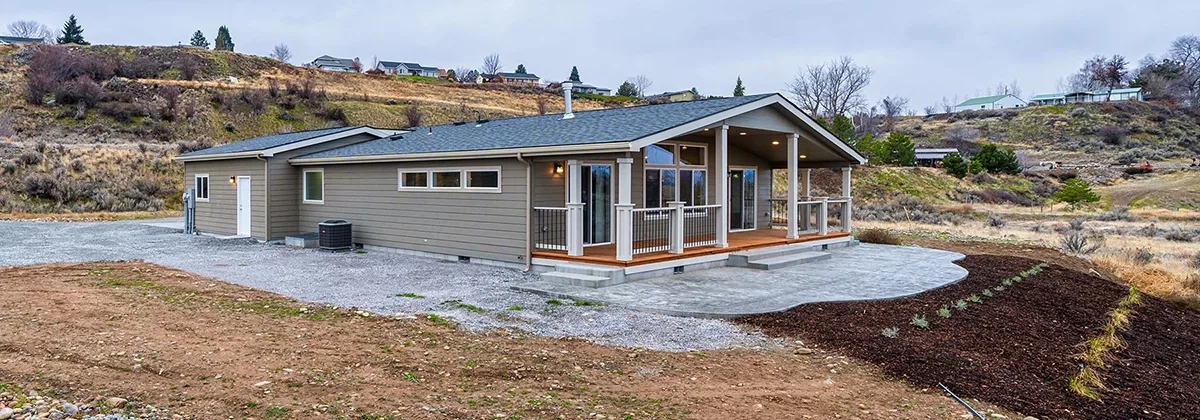How to Finance a Manufactured Home in Oregon
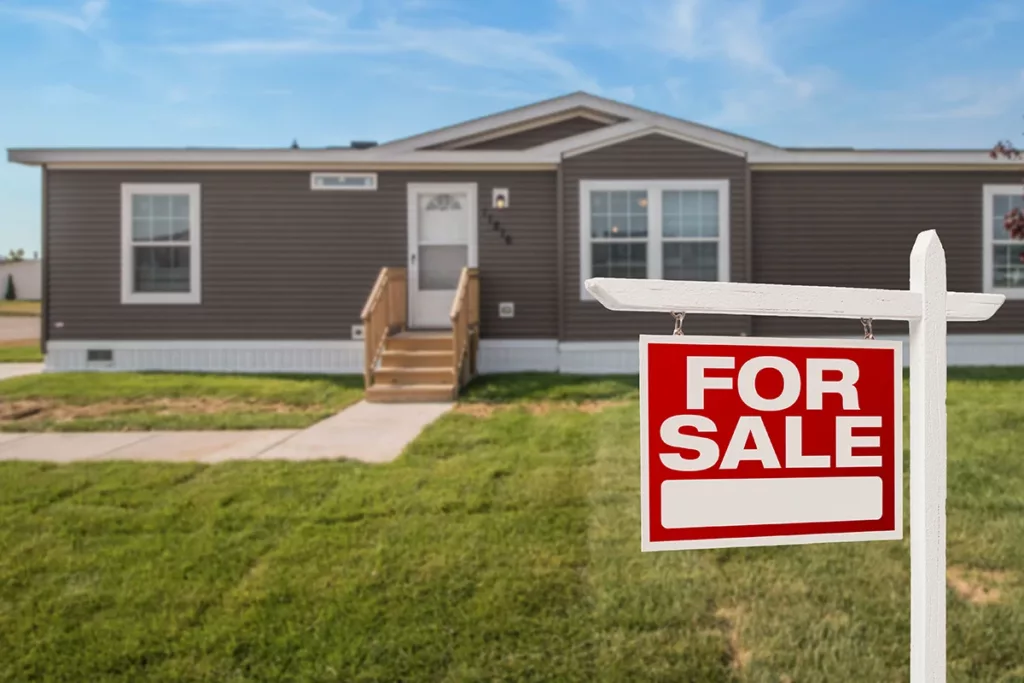
For many, homeownership in Oregon is a cherished dream, and manufactured homes offer an affordable path to make that dream a reality. Manufactured houses feature modern amenities, energy efficiency, and customization options, all at a fraction of the cost of stick-built homes. Manufactured homes can also be financed, but finding the best financing option for your needs will depend on a number of factors. So, if you want to learn how to finance a manufactured home in Oregon, you’re in the right place.
Your Guide to Financing a Manufactured Home in Oregon
Before we cover how to finance a manufactured home, it’s important to establish the difference between manufactured, mobile, and modular homes. Although these three terms are often used interchangeably, there are key differences that play a role in determining which type of home loan is best for you.
Manufactured Homes
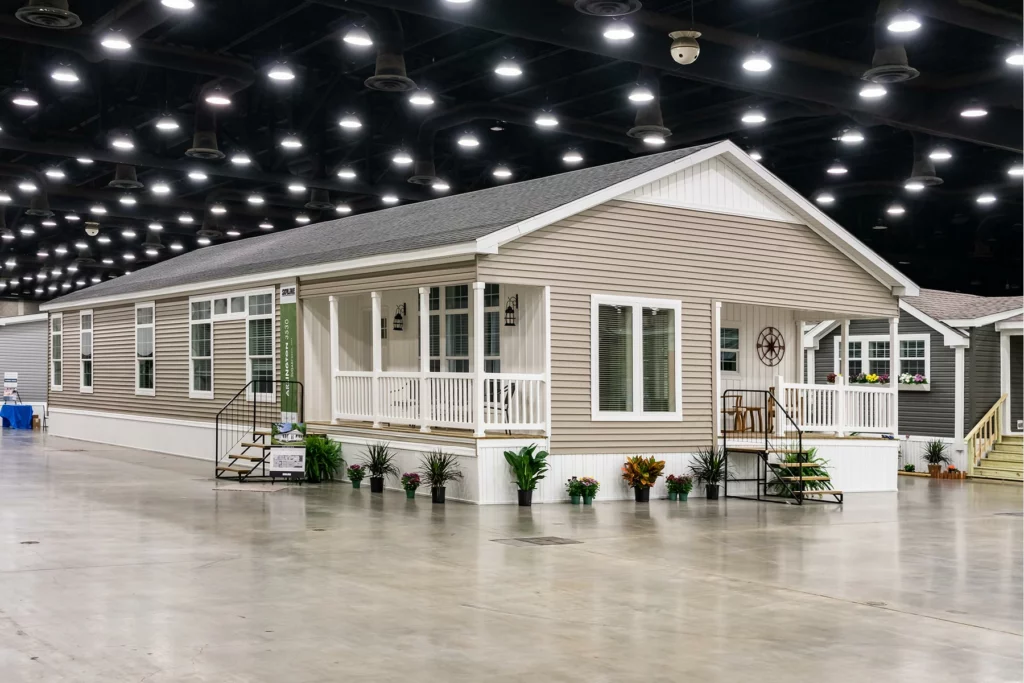
Manufactured homes are constructed in an environmentally controlled factory according to strict quality and safety regulations set by the Department of Housing and Urban Development (HUD). They are then transported, fully assembled, to their final destination, which could be just about anywhere. Manufactured homes can be placed on leased land, in manufactured home communities, or on private land that you own.
Although manufactured homes are similar to traditionally built homes in terms of the final product, factory-built houses are not always guaranteed to qualify for a conventional mortgage. Alternative financing methods could be more feasible for manufactured homes, which we will explore further in this guide.
Mobile Homes
In 1980, the term “mobile home” was declared obsolete. The name still applies to any factory-built house manufactured prior to June 15, 1976, but any home built after the fact is a manufactured home. This was to help distinguish older, lower-quality houses from newer factory-built homes constructed according to updated quality and safety standards established by HUD.
Modular Homes
Modular homes are constructed in factories the same way that manufactured homes are. However, from a legal standpoint, the primary difference between modular homes and manufactured homes is their building codes.
As we explained above, manufactured homes are built according to federal building codes set by HUD. Modular homes on the other hand are held to the same local and state building codes required for traditional site-built homes. This is why modular homes are treated similarly by lenders and are therefore financed using the same type of loans.
How to Get a Loan for a Manufactured Home in Oregon
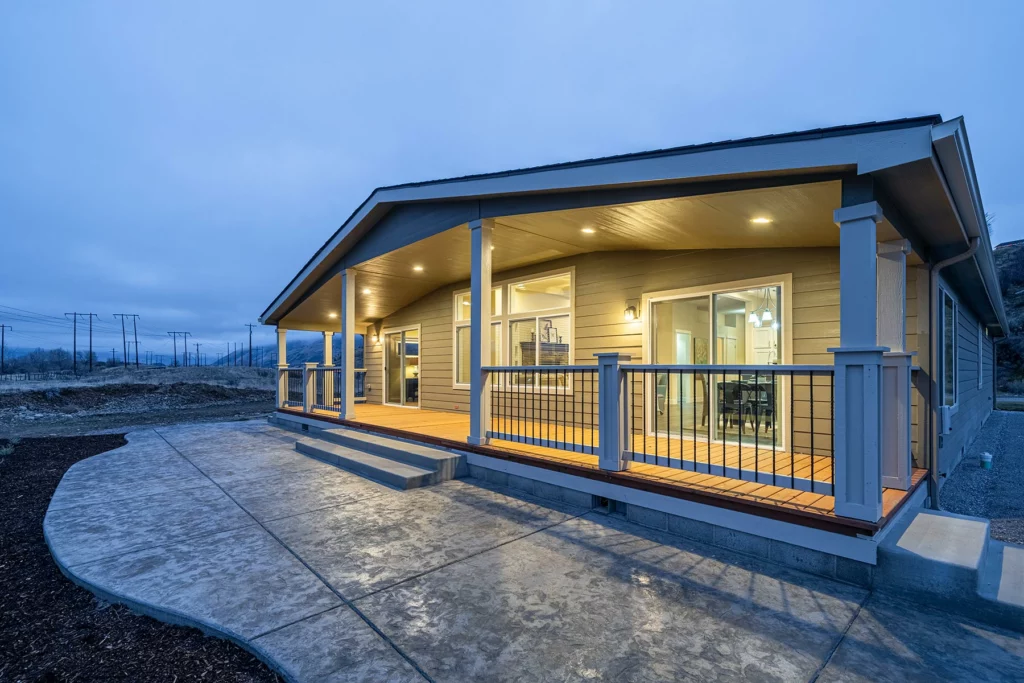
To be eligible for a mortgage loan for a manufactured home, you must meet certain criteria as a borrower. Similar to the requirements of traditional mortgages, to qualify for a manufactured home loan you must have a satisfactory credit score, sufficient income, and the ability to make a down payment.
Requirements for manufactured home loans can vary depending on the lender and the type of loan you’re applying for. However, some common requirements for people seeking financing for a manufactured home include:
- A minimum of 400 square feet of living space
- Being permanently attached to a foundation located on land that you own
- Legally considered “real property” not “personal property”
Keep in mind that these requirements can differ for individual lenders. It’s important to consult with lenders who specialize in manufactured home financing and understand the specific requirements in your area.
Real Property vs Personal Property
When financing a manufactured home purchase, it’s crucial to understand the difference between “real property” and “personal property,” as these two classifications can heavily influence the type of financing options that will be available to you.
While other factors like taxes are often involved, real property refers to land, and anything permanently attached to it. This can include not only the land itself but also any permanent structures such as houses, buildings, and in some cases, manufactured homes.
When a manufactured home is considered real property, it means that it is permanently affixed to a foundation on land that the homeowner owns. In such cases, the manufactured home is treated like a traditional stick-built home in terms of property rights and financing.
Personal property on the other hand refers to movable items that are not permanently affixed to the land. In the context of manufactured homes, this means that the home is not permanently attached to a foundation.
Manufactured Home Loan Options
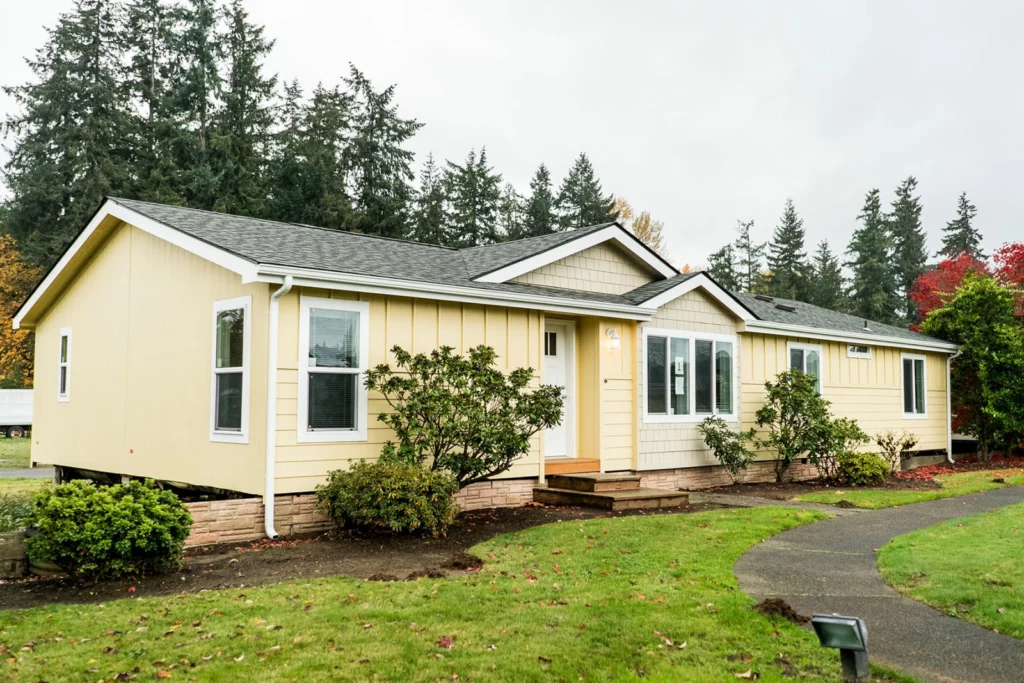
Financing a manufactured home can be similar to financing a traditional home in many ways, but there are some specific considerations and requirements you should be aware of. For instance, manufactured homes are often financed through loans specifically designed for this type of housing:
Conventional Loans for Manufactured Homes
Government-sponsored enterprises (GSEs) like Fannie Mae and Freddie Mac both offer conventional loans specifically created for manufactured homes. The objective of these initiatives is to enhance housing accessibility by offering affordable avenues to home ownership.
Conventional loans through Freddie Mac and Fannie Mae accept down payments as low as 3%, although additional fees and higher interest rates are often included to mitigate risk.
Fannie Mae
As a government-supported enterprise, Fannie Mae offers two major programs, MH Advantage and HomeReady:
MH Advantage: Delivers financing for qualifying manufactured homes that are at least 12 feet wide, with a minimum of 600 square feet of livable space. Many buyers choose this lending program for benefits like the potential for longer loan terms, low down payments (as little as 3%), and similar interest rates to stick-built houses.
HomeReady: Aims to assist individuals with low to moderate incomes and limited down payment funds. Designed for manufactured homes, this program provides qualified borrowers with advantages like lower mortgage insurance expenses, decreased interest rates, and more.
Freddie Mac
As part of their “Duty to Serve” program, Freddie Mac’s manufactured home loan initiative offers two main options, the Real Property Loans and the MH Advantage program:
Real Property Loan: To qualify, your manufactured house must be classified as “real property” as opposed to “personal property,” which means it must be permanently fixed to the land owned by the buyer.
MH Advantage: This program finances manufactured houses that are built on a permanent chassis and contain a minimum of 400 square feet of living space. Funding offered for individuals who are eligible for this program is similar to the funding provided for conventional-built homes, with the potential for reduced down payments and extended loan terms.
FHA Title II Loans
The Title II loan program offered by the Federal Housing Administration (FHA) is explicitly designed for manufactured homes. Since financing is insured by the FHA, individuals with a minimum credit score of 580 can secure loans with only 3.5% down, as long as the home is classified as the buyer’s primary place of residence.
The FHA Title II loan program allows manufactured houses that are classified as “real property” to receive financing like a conventional mortgage. To qualify, the home must contain at least 600 square feet of living space and be compliant with HUD safety codes. The home must also be fixed to a foundation located on land that you own and satisfy all applicable local and regional building regulations.
Land-in-Lieu Financing for Manufactured Homes
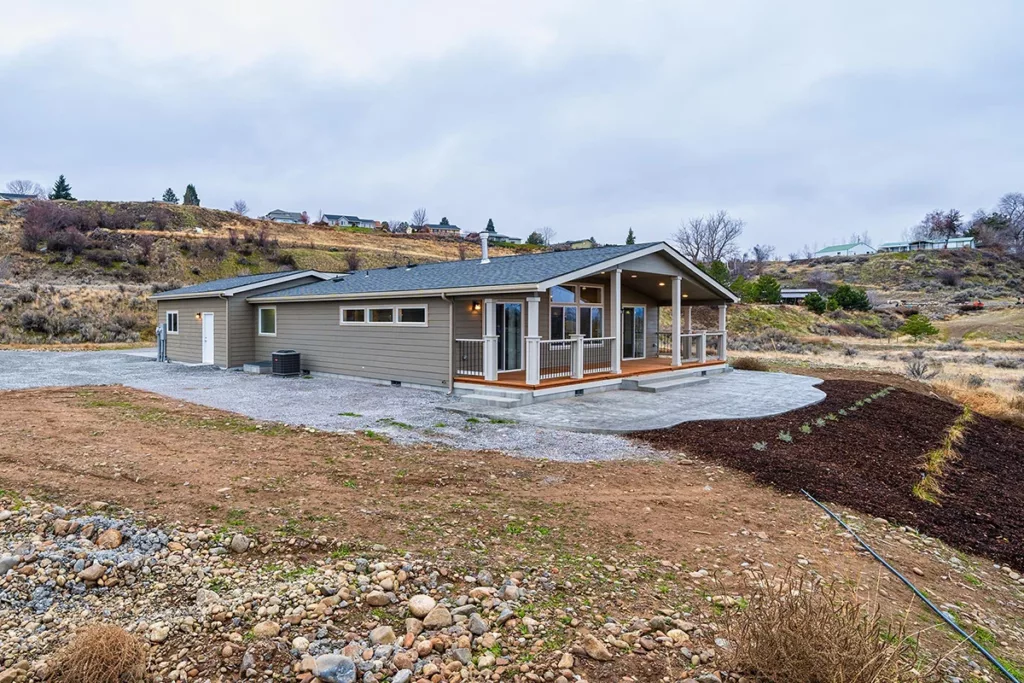
A popular manufactured home financing option is a land-in-lieu loan, in which you provide the required down payment and then use the equity on existing property you already own to secure a loan. The land can be raw or developed, and any construction costs required to install the home can be lumped into the entire loan as well.
Land-in-lieu financing for a manufactured home offers several advantages, including:
- Funds can be used for any purpose
- Land-in-lieu loans are often eligible for extended repayment periods
- Can have fixed or adjustable rates
A land-in-lieu loan works by using your land as collateral, which will then be susceptible to foreclosure if the loan isn’t repaid properly. You will also need to satisfy specific credit, income, and debt-to-income ratio requirements in order to qualify for land equity loans.
VA Loans for Manufactured Homes
The VA loan program is designed for veterans and active-duty military members who are looking to secure financing for a manufactured home. These loans are insured by the U.S. Department of Veterans Affairs and can help qualified veterans purchase land along with a manufactured house. You would be required to put a minimum of 5% down, and repayment periods tend to last 20-25 years.
VA loans offer some of the most affordable rates available in order to make housing more accessible for eligible veterans and active-duty military members.
USDA Manufactured Home Loans
If you are purchasing a brand-new manufactured home, you could be eligible for financing offered by the U.S. Department of Agriculture (USDA). These mortgages are a part of the USDA’s Rural Development Guaranteed Housing Loan program, with advantages like decreased mortgage insurance, no down payment requirement, and affordable mortgage rates. In fact, USDA home loans offer some of the most competitive rates available, second only to VA loans.
The two main types of USDA loans applicable to purchasing a manufactured home are a USDA guaranteed loan and a USDA direct loan:
USDA guaranteed loan: While offered by a private lending firm, this loan is partially government-backed to decrease lender risk and promote more favorable buyer terms. To qualify, buyers must satisfy income restrictions and rural area eligibility requirements.
USDA direct loan: This initiative is designed for low to moderate-income families who are purchasing a brand-new manufactured home in designated rural areas with a population of under 20,000. These loans are USDA-funded, unlike private-funded USDA-guaranteed loans. With reduced interest rates and extended repayment periods of up to 38 years, a USDA direct loan offers advantages to qualified individuals in eligible rural locations.
Additional requirements for a manufactured house to be eligible for a USDA home loan include permanent attachment to a foundation, compliance with HUD regulations, and a minimum of 400 square feet of living space.
Manufactured Home Loan Options if You Don’t Own Land
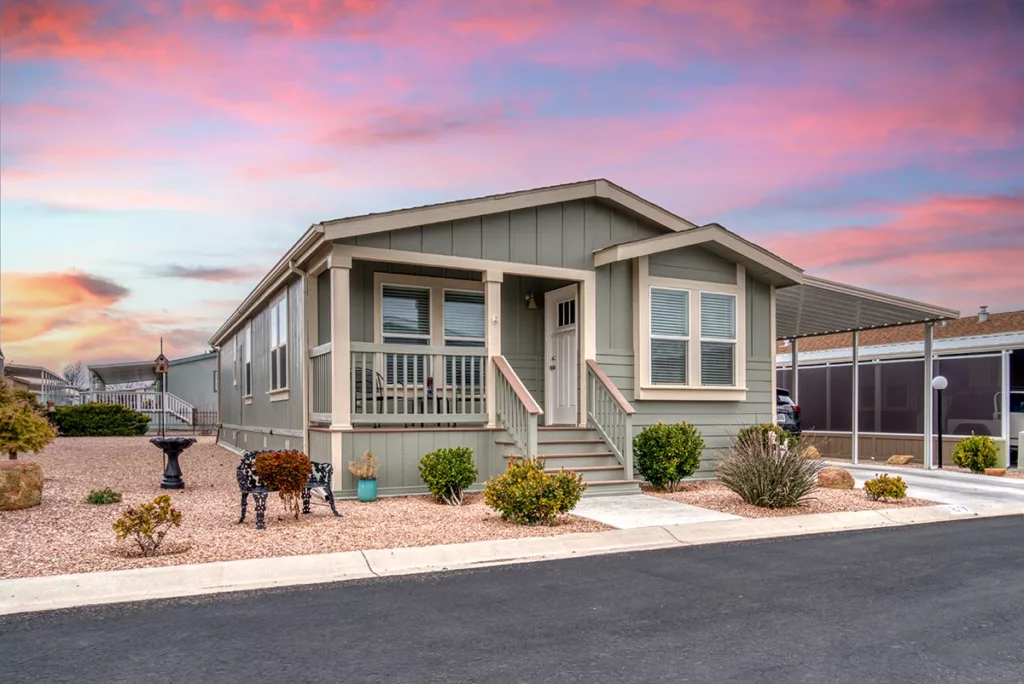
If you’re interested in purchasing a manufactured home but don’t own land, it’s still possible to get financing. Manufactured home loan options for people who don’t own land include:
Chattel Loans
A chattel loan is specifically designed for property that isn’t attached to land, making it unavailable for stationery homes. This loan is suitable for anyone purchasing a manufactured home but leasing the land that they will be putting the house on.
With chattel financing, the manufactured home acts as collateral for the loan, which means there’s a possibility it could be possessed by creditors or lenders if you default on your chattel mortgage. With shorter payment periods and higher APR and interest rates, monthly payments will also be slightly higher. However, this also means that the loan will be repaid quicker.
FHA Title I Loans
FHA Title I loans can help you finance a manufactured home and the land you want to place it on. The purpose of this program is to assist people and families who may not meet the requirements for conventional financing.
For instance, if you don’t own land but would like to finance the purchase of a manufactured home for a rented lot, a Title I loan can help you secure a loan to do so. You can also choose to finance just the land or a combination of both, which is a good option for individuals who are interested in owning land but just don’t have it yet.
The maximum term for each loan is 20 years for a manufactured home only, 15 years for land only, and 25 years for a combination loan.
Find Luxury Manufactured Homes for Sale in Oregon Today
If you’re looking for an affordable avenue to homeownership in Oregon, a manufactured home could be the perfect cost-effective option for you. From first-time home buyers, growing families, and even retirees and empty nesters, affordable homeownership is made easy with a manufactured home loan. If you’re ready to take the first step toward finding your dream home, Len’s Home Center is here to serve.
For over 50 years, we have been helping Oregon residents find the perfect luxury manufactured home to call their own. We offer flexible financing options and work with trusted lenders who ensure a streamlined and stress-free process every time.
Contact us online or give us a call at (541)-269-9326 so we can help bring your dream to life!
